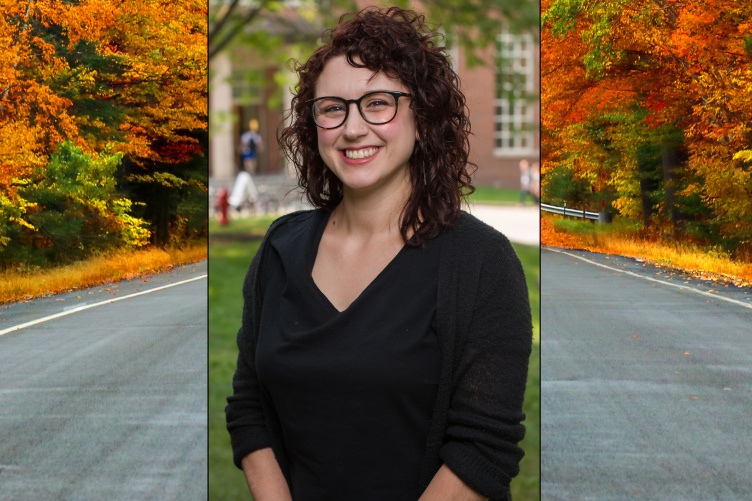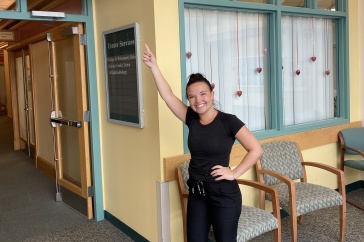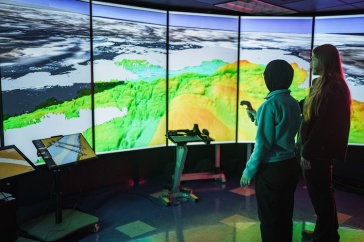
You don’t always know the moments that will help shape your life.
“I remember being like six or seven years old in the car with my family on a road trip and looking out the window and thinking, you don't really see people driving a yellow car very often, but when you do see a yellow car, it seems like women are driving,” recalls Dr. Jess Carson, research assistant professor of public policy at Carsey. The observation felt true, but the young Dr. Carson felt pulled to somehow test her hypothesis. “I had a little etch-a-sketch in the backseat with me. I took notes of the cars passing us by and tried to record what I saw.”
The road trip continued, the sketched notes were lost to time, and the memory of the yellow car question faded until more than a decade later when Dr. Carson enrolled at the University of New Hampshire as an undergraduate. Sitting in the back of a large lecture hall her freshman year, she listened closely as the professor outlined an unfamiliar field of study: sociology.
“I remember sitting and listening to the professor talk and just having this aha moment dawn on me! …After that first class, I had no doubt what I wanted to study,” she says.
What resonated for Dr. Carson was the prospect that sociology could help give order to a social world that otherwise can feel random or unknowable. The idea that research could help her understand the underlying structures to how people behave and interact with each other had her instantly hooked. In that moment, she flashed back to counting cars out the window as a kid.
“That little social observation,” she says through a laugh, “that was my very first sociological study: The Yellow Car Study.”
More than twenty years later, Dr. Carson is still in UNH classrooms, only now she’s the one inspiring aha moments. After completing her bachelor’s, master’s, and doctorate degrees in Durham, she was quickly snapped up by the Carsey School to work as part of a research team. Dr. Carson’s central role over the years has been as a researcher, but a few years ago, she was given the chance to try her hand at teaching as well. The course was called “Quantitative Methods for Policy Research,” and she decided to dive in.
“I never pictured myself [teaching.] I thought I don’t know if I’m gonna like this… And it was fantastic! I loved it,” she raves. Even through hybrid classrooms and instructing over Zoom, the chance to connect directly with students has been one of the most rewarding parts of her career. “I’ve continued to teach every fall semester since then, and I like it more every time.”
The course is designed to teach students how to use statistics to understand sociological research in applied public policy settings. To make the lessons tangible and demonstrate the practicability of the work, Dr. Carson incorporates actual data from her ongoing projects in the class. Using real-world evidence, students learn how to do statistical modeling and even write their own research briefs over the course of the semester. Her passion for the subject is infectious; it’s easy to imagine Dr. Carson in front of a classroom, inspiring graduate students to continue into the field.
“Statistics is magical to me. It can help us to answer so many questions about the real world. I just love having a chance to bring students into that world with me and to give them the tools to make sense of their own world.”
“Statistics is magical to me. It can help us to answer so many questions about the real world,” she says. “I just love having a chance to bring students into that world with me and to give them the tools to make sense of their own world.”
In addition to teaching and her own research, Dr. Carson is also director of the Center for Social Policy in Practice. The center spearheads most of the social policy research done at Carsey, which covers a huge variety of areas and fields. The research Dr. Carson has worked on there has covered topics ranging from early childhood education, to local food systems, to Covid-19 public health responses, and more.
She hopes that the research can help give policymakers the tools to ensure that the job market and the safety net work for everyone, regardless of circumstance. One of the threads that Dr. Carson sees connecting the work the center does is the focus on place-conscious or context-oriented research, which investigates how policy outcomes and effectiveness vary by location.
“Our work comes in after the policies are made to help make sense of how policy works differently—better or worse—for people with different characteristics or in places with different qualities.”
To outsiders, it may seem strange to place such import on differences across location, as New Hampshire is one of the smallest states both geographically and demographically. However, the state is home to an incredible variety of communities, whose residents will need all different things from government structures. Dr. Carson understands this dynamic of the state as well as anyone: she’s lived every minute of her life in New Hampshire.
“Always having lived here completely colors the way that I approach the world,” she says. “I care a lot about making sure that policies work for people in Manchester but also in Colebrook and that everybody throughout the Granite State has access to the kinds of supports and opportunities that they need to really do well and live a kind of thriving life.”
Doing research in a small state also has a large upside.
“Because the state is so small, when you're thinking about potential for impact, it really does feel possible that research and good data could change things. That's a really exciting feature of being able to do research here.”
“Because the state is so small, when you're thinking about potential for impact, it really does feel possible that research and good data could change things,” Dr. Carson says. “That's a really exciting feature of being able to do research here.”
Over the course of her career, Dr. Carson has also discovered that New Hampshire has much to offer when it comes to the kind of wide-ranging, deep research she specializes in. She has had no trouble finding community partners to work with, or professional networks interested in collaboration. She stresses that the quality of a researcher’s work really depends on the relationships you can make with colleagues, and that New Hampshire is full of such connections.
While the abundance of professional links beyond UNH has been an asset in her career, Dr. Carson always brings the discussion back to Carsey. The breadth of her peers’ expertise makes for rich scholarly soil. She and the other researchers are constantly pushing each other forward and building each other up, which she credits to the school’s cooperative atmosphere and diverse fields of study. Dr. Carson has treasured her first decade at the school and is looking forward to more to come.
“There's so much opportunity here to connect and collaborate. I feel like it's an ever-blooming flower, finding new ways to connect with my coworkers here.”
Reported by Benjamin Scott Savard ‘23G
















































